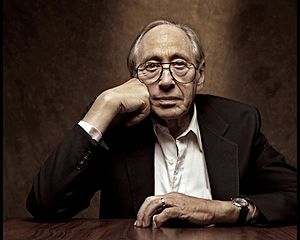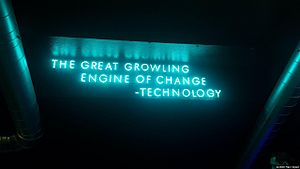Alvin Toffler facts for kids
Quick facts for kids
Alvin Toffler
|
|
|---|---|

Toffler in 2006
|
|
| Born | October 4, 1928 New York City, U.S. |
| Died | June 27, 2016 (aged 87) Los Angeles, California, U.S. |
| Resting place | Pierce Brothers Westwood Village Memorial Park and Mortuary, Westwood, Los Angeles |
| Occupation |
|
| Alma mater | New York University (B.A.) |
| Notable works |
|
| Notable awards |
|
Alvin Eugene Toffler (born October 4, 1928 – died June 27, 2016) was an American writer and futurist. A futurist is someone who studies and predicts what might happen in the future. Toffler was famous for his ideas about how new technologies, like computers and the internet, change cultures around the world. Many people thought he was one of the best futurists.
He worked as an editor for Fortune magazine. Early on, he focused on how technology affects us. He even came up with the term "information overload," which means having too much information to deal with. In 1970, his first big book about the future, Future Shock, became a huge success worldwide. It sold over 6 million copies.
Alvin Toffler and his wife, Heidi Toffler, worked together on most of his books. They looked at how society reacts to big changes. Their next best-selling book, The Third Wave (1980), was very popular. In this book, he predicted many things we use today, like personal computers, the internet, cable TV, and mobile phones. Later, their book Powershift (1990) focused on how military technology and new inventions were changing the world.
Alvin Toffler also started a company called Toffler Associates, which helps businesses with their plans. He taught at several universities and advised important leaders around the world. His ideas influenced many people, including China's leader Zhao Ziyang and the founder of AOL, Steve Case.
Contents
Early Life and Education
Alvin Toffler was born in New York City on October 4, 1928. He grew up in Brooklyn. His parents, Rose and Sam Toffler, were Polish Jews who moved to America. His aunt and uncle, who lived with his family, inspired him to become a writer when he was just seven years old. He said they were "literary intellectuals" who always talked about exciting ideas.
Toffler went to New York University and finished in 1950. He studied English, but he was more interested in political activism than his grades. He met his future wife, Adelaide Elizabeth Farrell, known as "Heidi," there. They were both radical students. Instead of continuing graduate school, they moved to Cleveland, Ohio, and got married on April 29, 1950.
Career and Major Works
Alvin and Heidi Toffler wanted to gain real-world experience for their writing. For five years, they worked in factories on assembly lines. They studied how industrial mass production worked every day. Heidi even became a union shop steward at an aluminum factory. Alvin worked as a millwright and welder. In the evenings, Alvin tried writing poetry and fiction, but he found he wasn't good at them.
His factory experience helped Alvin Toffler get a job at a union newspaper. In 1957, he moved to its Washington office. For three years, he worked as a White House correspondent, reporting on Congress and the White House for a newspaper in Pennsylvania.
In 1959, they returned to New York City. Fortune magazine hired Alvin to write about labor, and later about business and management. After leaving Fortune in 1962, Toffler became a freelance writer. He wrote long articles for academic journals and magazines. His interviews with famous writers like Vladimir Nabokov and Ayn Rand in 1964 were highly praised.
Companies like IBM hired Toffler to research how computers would affect society. This led him to meet early computer experts and artificial intelligence researchers. Xerox asked him to write about their research lab. AT&T even asked for his advice on their future plans. He suggested that AT&T should split into smaller companies, which actually happened more than ten years later.
In the mid-1960s, the Tofflers spent five years researching their book Future Shock, which came out in 1970. This book has sold millions of copies and has been translated into many languages. Toffler created the term "future shock" to describe what happens when society changes too quickly. He said it can cause confusion and make it hard for people to make good decisions.
He continued this idea in The Third Wave in 1980. He described the "first wave" as the agricultural revolution and the "second wave" as the industrial revolution. The "third wave," a term he also created, is the current information and computer revolution. He predicted the rise of the internet, email, interactive media, and even cloning. He also said that having too much information, or "information overload," would be a problem in the digital age. In 1990, he and Heidi wrote Powershift.
In 1996, Alvin and Heidi Toffler, along with business consultant Tom Johnson, started Toffler Associates. This company helps businesses, non-profit groups, and governments use the ideas the Tofflers wrote about. During this time, Toffler gave speeches around the world, taught at schools, and met with global leaders like Mikhail Gorbachev.
Alvin Toffler's Ideas
Toffler shared many of his ideas in an interview in 1998. He said, "Society needs people who take care of the elderly and who know how to be compassionate and honest." He also believed that society needs all kinds of skills, not just smart thinking. He stressed that we can't run society only with data and computers.
His thoughts on the future of education, many of which were in Future Shock, are often quoted. A famous quote, often linked to him, is from psychologist Herbert Gerjuoy: "Tomorrow's illiterate will not be the man who can't read; he will be the man who has not learned how to learn." This means that learning how to keep learning is more important than just knowing facts.
Early in his career, Toffler noticed that people visiting new countries sometimes felt "disoriented and upset" by the strange environment. He called this "culture shock." He then realized that a similar problem could happen when a "new environment comes to you... rapidly" in your own country. This sudden cultural change, which he felt many would not understand, would lead to "future shock."
In The Third Wave, Toffler described three types of societies, based on "waves" of change. Each new wave pushes older ways of life aside.
- The First Wave was the society that came after the agricultural revolution. This was when people started farming instead of hunting and gathering.
- The Second Wave was the society during the Industrial Revolution (from the late 1600s to the mid-1900s). During this time, more people moved to cities to work in factories. This changed traditional families and led to factory-like school systems.
- The Third Wave is the term he used for the post-industrial society, which began in the late 1950s. This period is also called the Information Age or Space Age. It's a time of big scientific and technological changes. The Tofflers believed they predicted many big events, like the fall of the Soviet Union and the growth of Asian economies.
Influence and Popular Culture
Toffler often met with important people in Asia, like China's Zhao Ziyang and Singapore's Lee Kuan Yew. These leaders were influenced by his ideas as Asian markets grew in the 1980s and 1990s. Even though China's government first censored some of his books, they later said he was one of the Westerners who most influenced their country. The Third Wave and a documentary based on it became best-sellers in China and were widely used in schools.
In the U.S., House Speaker Newt Gingrich praised Toffler's ideas. He encouraged members of Congress to read Toffler's book, Creating a New Civilization (1995). Steve Case, the founder of AOL, said The Third Wave greatly influenced his thinking. He even wrote his own book called The Third Wave: An Entrepreneur's Vision of the Future in 2016. Case said Toffler was a "real pioneer" in helping people and countries prepare for the future.
In 1980, Ted Turner started CNN. He said he was inspired by Toffler's prediction that the three main TV networks would no longer be dominant. Turner's company later published Toffler's Creating a New Civilization in 1995. After this book came out, former Soviet president Mikhail Gorbachev hosted a big conference called Toward a New Civilization. Many world figures attended, including the Tofflers, George H. W. Bush, and Margaret Thatcher.
Mexican billionaire Carlos Slim was also influenced by Toffler's books and became his friend. Global marketer J.D. Power also said Toffler's work inspired him.
Since the 1960s, people have tried to understand how new technologies and social changes affect us. Toffler's writings helped many people think about these issues. Some people criticized his ideas, saying it's impossible to predict the future.
Techno music pioneer Juan Atkins said Toffler's phrase "techno rebels" in The Third Wave inspired him to use the word "techno" for the musical style he helped create.
Musician Curtis Mayfield released a song called "Future Shock." Science fiction author John Brunner wrote "The Shockwave Rider," based on the idea of "future shock."
A nightclub in Rotterdam, The Netherlands, is named Toffler after him.
Critical Assessment
In 2002, the management consulting firm Accenture said Toffler was one of the most influential voices for business leaders, along with Bill Gates. The Financial Times called him the "world's most famous futurologist." In 2006, China's People's Daily newspaper listed him among the 50 foreigners who shaped modern China. Chinese Premier Zhao Ziyang was greatly influenced by Toffler. He held meetings to discuss The Third Wave in the early 1980s, and in 1985, the book was the second best-seller in China.
Newt Gingrich became close to the Tofflers in the 1970s. He said The Third Wave greatly influenced his own thinking and was "one of the great seminal works of our time."
Selected Awards
Alvin Toffler received many important awards. These include the McKinsey Foundation Book Award for his contributions to management writing. He was also made an Officier of Ordre des Arts et des Lettres, a French award for arts and literature. He was also a Fellow of the American Association for the Advancement of Science.
In 2006, Alvin and Heidi Toffler received Brown University's Independent Award.
Personal Life
Alvin Toffler was married to Heidi Toffler, who was also a writer and futurist. They lived in Bel Air, California. Before that, they lived in Redding, Connecticut.
Their only child, Karen Toffler (1954–2000), passed away at age 46. She had been suffering from a condition called Guillain–Barré syndrome for over ten years.
Alvin Toffler died peacefully in his sleep on June 27, 2016, at his home in Los Angeles. He is buried at Westwood Memorial Park.
See also
 In Spanish: Alvin Toffler para niños
In Spanish: Alvin Toffler para niños
- Daniel Bell
- Norman Swan
- Human nature
- John Naisbitt
 | Charles R. Drew |
 | Benjamin Banneker |
 | Jane C. Wright |
 | Roger Arliner Young |


